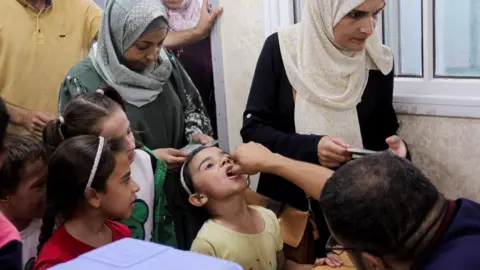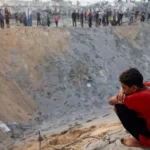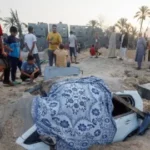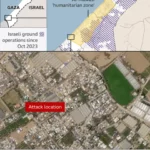Harris and Trump to debate in pivotal campaign test
Israeli strike in Gaza humanitarian zone kills 19, Hamas-run health ministry says
UK halts all Iran flights as allies step up sanctions
Harris and Trump to debate in pivotal campaign test
Israeli strike in Gaza humanitarian zone kills 19, Hamas-run health ministry says
UK halts all Iran flights as allies step up sanctions
Harris and Trump to debate in pivotal campaign test
Israeli strike in Gaza humanitarian zone kills 19, Hamas-run health ministry says
 Reuters
ReutersAn estimated 1.9 million people – more than 80% of the population – are estimated to have been displaced by the war, and some have had to flee as many as 10 times.
UN agencies and their partners are currently trying to stop the spread of polio in the overcrowded camps with poor sanitation where many of them are living.
The World Health Organization said the third phase of its vaccination campaign began in northern Gaza on Tuesday, after 446,000 children were inoculated in the centre and south earlier this month during localised pauses in the fighting agreed by Israel and Hamas.
On Monday, a team of 12 UN staff members on their way to the north to support the campaign was stopped by Israeli troops at a checkpoint for more than seven hours, according to UN Humanitarian Co-ordinator Muhannad Hadi.
“While at the checkpoint the team was informed that the IDF wanted to hold two of the UN staff members in the convoy for further questioning,” he said.
“The situation escalated quickly, with soldiers pointing their weapons directly towards the convoy personnel. Live shots were fired, and tanks and bulldozers approached, engaged with, and damaged UN vehicles, endangering the lives of UN staff inside the vehicles.”
The two staff were eventually questioned and then released following the intervention of senior UN officials to de-escalate the situation, he added.
The IDF said its forces had intelligence that a number of Palestinian suspects were present in the convoy, and that they delayed the convoy in order to question them.
Additional reporting by Thomas Mackintosh in London
UK halts all Iran flights as allies step up sanctions
The UK, France and Germany have announced fresh sanctions on Iran for supplying Russia with ballistic missiles for use in Ukraine, including restrictions on Iran Air’s ability to fly to the UK and Europe.
Also among the new measures, which have been announced as US Secretary of State Antony Blinken visits London, are travel bans on a number of Iranian military officials.
Mr Blinken said Russians had been trained by Iranian forces to use short-range missiles and they could be deployed against Ukrainians within weeks.
His host, UK Foreign Secretary David Lammy, said the Iranian deliveries marked a “dangerous escalation” which had allowed Russia to “fuel its illegal invasion of Ukraine”.
“Iran must stop supporting [Russian President Vladimir] Putin’s unprovoked, premeditated and barbaric attack against a sovereign democratic state,” Mr Lammy said. “The UK will stand with Ukraine for as long as it takes.”
Speaking earlier, alongside Mr Lammy at a news conference in London, Mr Blinken said Russian President Vladimir Putin was “increasingly relying on support” for Iran and North Korea to help “wage his war of aggression on Ukraine”.
The UK Foreign Office announced specific sanctions against several key individuals it said were heavily involved in the missiles supplies, including Iranian Brig Gen Seyed Hamzeh Ghalandari who commands the country’s exports of defence products to its partners. He has been placed under a travel ban and asset freeze, alongside two other Iranian officials.
Five Russian cargo ships have also been sanctioned for transporting the military supplies from Iran, despite what the UK said were repeated warnings not to do so.
Meanwhile, several organisations, including some allegedly involved in the production of Iran’s kamikaze-style Shahed drones – which Russia has used consistently in attacks on Ukrainian cities – have been sanctioned.
In a statement, the UK, France and Germany – known as the E3 – called on Iran “to immediately cease all support to Russia’s war against Ukraine and halt the development and transfers of its ballistic missiles”.
They added that Iran’s supply of missiles represented a “a direct threat to European security”.
Mr Blinken echoed the E3 statement, saying that the move “demonstrates how Iran’s destabilising influence stretches long beyond the Middle East”.
The Western sanctions come as Russia has continued to make gains in eastern Ukraine, with Moscow’s forces rapidly approaching the key settlement of Pokrovsk.
Pokrovsk is an essential transportation hub. If it falls, then Russian forces will cut off one of the main supply routes in the region. This will likely force Ukraine to retreat from Chasiv Yar and the front line will move closer to Kramatorsk, a major industrial city.
The Iranian short range missile deliveries will aid the Russian advance, Mr Blinken said, by allowing Moscow to use more of its existing arsenal for targets that are further from the frontline, while reserving the new missiles for closer range targets.
The top US diplomat hit out at the new Iranian government, led by President Masoud Pezeshkian, who is said to desire a less adversarial relationship with the West.
“Iran’s new president and foreign minister have repeatedly said that they want to restore engagement with Europe. They want to receive sanctions relief. Destabilising actions like these will achieve exactly the opposite,” he said.
Mr Blinken and Mr Lammy also announced a joint trip to Ukraine this week, the first joint trip in years as UK diplomats seek to frame the secretary of state’s visit as a reaffirmation of a close partnership between the two countries, often described as the “special relationship”.
Mr Blinken said one of their goals ahead of the visit was to “hear directly from the Ukrainian leadership” about their “objectives and what we can do to support those needs”.
UK Prime Minister Sir Keir Starmer has made clear the UK government will continue to back Ukraine and send £3bn in military support to the country for as long as needed.
Last week, the UK government said it was sending hundreds more short-range missiles to Ukraine in a package worth £162m.
But Ukrainian President Volodymyr Zelensky has criticised the pace of weapons deliveries, and asked for authorisation to strike targets deep inside Russia with Western-supplied missiles – a move the US has thus far resisted.
Mr Blinken would not be drawn on what their answer will be this time to President Zelensky’s longstanding plea during talks in Kyiv.





